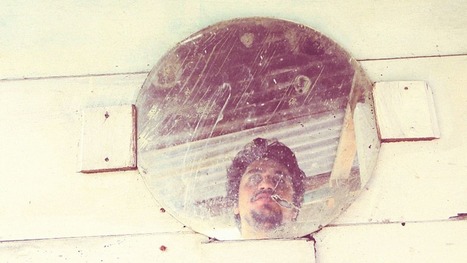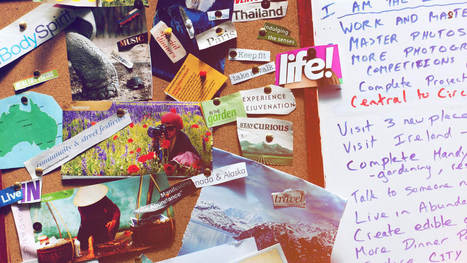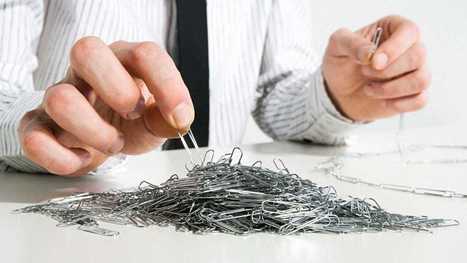 Your new post is loading...
 Your new post is loading...
What do you really need to get ahead at work? I get asked this all the time. The answer varies depending on the person, their goals, and my mood, but there’s one answer I’ll never give: “Work hard.” That’s not an oversight or a misstep. It’s very intentional. Whenever I hear some public speaker or Silicon Valley personality talk about how it just takes hard work to really succeed, I can’t help but roll my eyes a little. I’m sick of hearing people talk about working hard, keeping busy, putting their head down, etc. We’ve become too preoccupied with “the grind,” and it’s actually bringing us down.
Via The Learning Factor
"Workload has always been an issue in the teaching profession. Over the years I’ve picked up a few handy hints to help me get through it all. There are lots of free tools you can use to help y…"
Via Leona Ungerer
Of all the things you learned in school, chances are the right way to learn wasn’t one of them. To make it through academic life, most of us opt for what psychologists call “massed practice,” better known as cramming: It’s Monday and your test is Friday, so you save studying for the night before. One four-hour session can nab you a passing grade, so why not? Well, because that’s not how your brain likes to absorb information. You might remember enough to pass your exam the next day, but just a week or two later and the details will already be fuzzy, if not gone completely. Here’s how to do better.
Via The Learning Factor
If you’re constantly frazzled on the job, logging super-long hours with little to show for it at the end of the day, chances are good that you’re mismanaging your time. But the good news is it’s easy (enough) to reorganize your schedule and get back on a successful track, stat! “There’s a lot coming at us: mail–and [all kinds of] paper in general–emails, texts, phone calls, bosses calling for help, deadlines, projects–it doesn’t stop,” points out Felice Cohen, organizer and author of 90 Lessons for Living Large in 90 Square Feet (or More). No wonder so many of us get so behind and feel so exasperated. But it doesn’t have to stay that way. The answer isn’t to do more. “Not everyone can multitask, and most of us who do probably shouldn’t,” says Cohen. Rather, the answer is to do what you do smarter. And here’s how.
Via The Learning Factor
It’s no understatement that digital mediums have taken over every aspect of our lives. We check what our friends are doing on the glowing screens in our hands, read books on dedicated e-readers, and communicate with customers and clients primarily through email. Yet for all the benefits digital mediums have provided us, there has been a growing body of evidence over the past several years that the brain prefers analog mediums. Studies have shown that taking notes by longhand will help you remember important meeting points better than tapping notes out on your laptop or smartphone. The reason for that could be that “writing stimulates an area of the brain called the RAS (reticular activating system), which filters and brings clarity to the fore the information we’re focusing on,” according to Maud Purcell, a psychotherapist and journaling expert. If that’s the case, and the analog pen really is mightier than the phone, it’s no wonder some of my colleagues have ditched smartphones for paper planners.
Via The Learning Factor
Worrying about deadlines, work flow or employee issues is natural for people working in the business world. Stress happens. You have options, though, on how you deal with stress. Sometimes, taking a moment to recenter yourself is all you need to do: By putting things into perspective, you can find the grit to keep going. That’s not always the best course of action, though. If you find that a particular task or job regularly leaves you feeling overwhelmed, drained or quietly angry, you may want to rethink how you approach the work or even consider whether you’d be better suited for a different sort of job or different company.
Via The Learning Factor, Bobby Dillard
Let’s face it: Negative feedback on your job performance can be a drag. Who likes to be told that their work could use improvement? Research published in the Harvard Business Review provides some interesting insight into receiving and giving such feedback. While managers by and large avoided giving negative feedback or praise, employees craved it. And they weren’t looking for platitudes, either—57% wanted corrective feedback versus 43% who wanted praise. Seventy-two percent said that corrective feedback could improve their job performance. Still, it’s one thing to think about that in theory—and another to hear from your manager, “We need to talk about your performance . . .” If you do find yourself on the receiving end of negative feedback or criticism, here’s how to cope.
Via The Learning Factor
It’s hard to get anything done with all of the push notifications pulling us into other directions. You can find something else to do or think about at any given moment. But maybe the distractions aren’t the problem. Maybe it’s your willingness to be distracted that needs to be examined. “Distractions are by-products of a problem,” says Kyle Cease, author of I Hope I Screw This Up: How Falling In Love With Your Fears Can Change the World. “Something outside of you is pulling you away from yourself or a goal. But the distraction is actually on the inside, and what’s going on outside matches what’s going on inside.” We invite distractions as a way to handle three internal struggles, says Cease.
Via The Learning Factor
Whether you're at the starting line preparing to compete for the gold in the 100 meters or you're trying to be at your most productive state--how you start often predicts the outcome.
Via The Learning Factor, Bobby Dillard
How you spend your night can have a huge impact on the day that follows. Do you spend your time ruminating over issues? Or maybe you stress over something that didn't quite go right during the day. There's no doubt, how you think affects how you feel. This is particularly important at night as you try to unwind and prepare for rest. This sets you up for sleep which serves many vital purposes. When I look at my clients who achieve the most during their days and are happiest, they are the ones who have a healthy routine at night. They set themselves up for success the following day by thinking and acting in a particular way.
Via The Learning Factor
Of all our available resources, everyone has the same number of hours in a day. Some, however, happen to get more done. Are they faster or smarter? Do they have more help? Perhaps. But they’ve also learned tricks that can help them stretch time and eliminate the unimportant.
Here are six things super-productive people do every day to maximize their results and success.
Via The Learning Factor
The internet is chock full of daily habits that will help your routine, but what about bad habits? Because habits are so ingrained into our daily routines, we often don't notice how harmful ones sneak in and ruin our success. Try eliminating the following habits from your life and see how your success in business and in life improve:
Via The Learning Factor
Say you’re a high performer who's risen through the ranks. Now you have even bigger responsibilities. Or you're working your way toward a promotion and need to show your skills and professionalism in the best light. Then the phone call comes. The results of your medical tests weren't good. Or you suddenly have to take care of a loved one in an emergency. Or there's an unexpected financial hit that could spell catastrophe. Whatever the situation, your life just got much more complicated. While intuitively you know that these things can happen to anyone, the anxiety of dealing with such troubling events, coupled with the pressure to continue to perform in your job, amps up the stress to DEFCON 1. "A curveball like that requires sharpening your coping skills and expanding them so that you can deal with what’s being demanded of you," says clinical psychologist Alicia H. Clark, adjunct professor at the Chicago School of Professional Psychology. And there is a strategic approach you can take to help you cope and perform better, even when you’re operating under extreme stress.
Via The Learning Factor
|
Learning new things is an important part of career growth, and 87% of millennials say professional development opportunities factor into their job decisions, according to Gallup. Acquiring too much information, however, can be a problem, putting your career at risk of becoming stagnant, says Dom Price, work futurist-in-chief and head of R&D at the software development firm Atlassian in Sydney, Australia. “In the digital world, we’re privy to an abundance of knowledge,” he says. “We believe getting smart means knowing more, but in fact, it is not. We’re not practicing what we know. The acquisition of knowledge is dangerous when you don’t practice it.” In order to succeed, Price argues that you need to understand the importance of unlearning—identifying the things you know that you don’t have time to nurture, and then letting some of them go.
Via The Learning Factor
Be honest: How is your progress so far on those New Year’s resolutions you lined up just a few weeks ago? As January wears on and the cold, dreary weather continues for many of us, sticking with your resolutions can quickly start to seem more challenging than you’d expected–and sometimes completely impossible. If you’ve made and broken countless resolutions in the past and are already struggling this year, don’t give up hope just yet. It simply might be time to take a different approach to your resolutions. Understanding a little bit more about how the brain reacts to rewards and motivations could make the difference between forming a new habit for life and giving into temptation or laziness after a few weeks.
Via The Learning Factor
Learn smart, science-backed strategies for self-improvement in health, productivity, focus, decision making, or any other area of life.
Via Ariana Amorim
Doctors use the “universal pain assessment tool” to measure how uncomfortable their patients are. It’s a simple mechanism made up of smiley (and sad) faces. At one end of the spectrum is “pain free,” and on the other is “unimaginable, unspeakable pain,” with “tolerable” and “utterly horrible” falling in between. It’s not terribly scientific, but the tool helps medical professionals download your pain data from a little chip in your brain, so to speak, making it one of the best and fastest assessments at doctors’ disposal. It’s not just pain that’s difficult to quantify–so is the human experience generally. But researchers have devised tools to study other mushy concepts, too, including creativity. And in the process we’ve learned there’s at least one thing that tends to nudge people into measurably more creative thinking: boredom.
Via The Learning Factor, Bobby Dillard
As entrepreneurs, we often work late into the night, only to roll out of bed the next morning, picking up where we left off. One day bleeds into the next, making it seem as if we're always doing, doing, doing and searching for new and novel ways to do more. The truth is, your desire to do more and get more done will lead you not toward greater productivity, but toward burnout, if you don't take time each day to check in with yourself, and set your intention for how you want your day to proceed. Abraham Lincoln is credited with saying, "If I had six hours to cut down a tree, I'd spend the first four sharpening the axe." There is no evidence to suggest that Lincoln actually said this, but the point is not lost on us. How we prepare to do the task before us determines our success.
Via The Learning Factor
No matter where you are in your career, it’s only natural to occasionally feel as though there are things you’d like to change. But it’s one thing to say you want to make a change and quite another to actually make it happen. In order to make serious steps toward reinventing yourself, you need to first commit to it and then take action to make those changes a reality. Here are twelve ways you can reinvent yourself at work and in your personal life, backed by science.
Via The Learning Factor
We’ve all had those days: You’re under pressure to get things done, but you can’t seem to accomplish anything. There is still hope. Here are a dozen strategies you can put to work immediately to help you salvage your day and get more done.
Via The Learning Factor
Summer isn’t known to be the season for high productivity. Unplanned absences spike, especially on Mondays and Fridays and before holidays. These days off reduce productivity by 36.6%, according to a survey in the Society for Human Resource Management (SHRM). But that doesn’t mean your company needs to suffer. Whether you’re fighting the urge to take a day off or picking up the slack from a missing team member, it’s a good idea to create a summer productivity plan. We spoke to six productivity experts who shared their best advice for getting work done during the summer.
Via The Learning Factor
Early risers get a lot of good press: They are supposedly more productive and possibly better problem solvers. But after a month of forcing myself out of bed at 5 a.m., I learned that getting up early isn't always the best thing for you. I’m a morning person, and most days I’m out of bed by 5:45 a.m. I usually have 15 minutes before the rest of my household starts to wake, and I use this time to enjoy a cup of tea as well as the stillness of the morning. I look forward to this time so much that I wondered, What would happen if I expanded the 15 minutes to an hour?
Via The Learning Factor
I love working from home. I love the fact that I can crawl out of bed 5 minutes before work and still be on time. It thrills me that there’s no dress code and if I want to work in my birthday suit, I can. In fact, the Interaction Design Foundation’s philosophy of “work where you want” has allowed us to bring together a team of incredible talents and collaborative projects are a joy to work on too.
What I don’t love so much… is that with this much freedom, it’s sometimes hard to be as productive as I need to be. With that in mind, I’ve put together a short list of tips that might help others overcome this hurdle (they help me):
Via Edumorfosis, juandoming
There’s a growing body of research about how counterproductive multitasking can be. While we may feel like we’re getting more done, the reality is that regular multitasking can leave us with a diminishing ability to focus. That’s good to know. But if you’re a chronic multitasker who finds it hard to focus, is there any hope of getting your attention span back? While neuroscientist Daniel Levitin, psychology professor at McGill University in Montreal and author of This Is Your Brain on Music: The Science of a Human Obsession won’t speak definitively for everyone, he says there are some general things most of us can do to improve our focus. Put these practices into place to sharpen your concentration and be more effective.
Via The Learning Factor
Feeling stressed lately? Chances are you're not alone. We carry varying degrees of stress around with us all the time—sometimes more, sometimes less. Does that pressure make us more productive or less? As with so many aspects of human psychology, the answer is: It depends. But what it depends on is something called the Yerkes-Dodson curve, a theory that dates back to 1908. Here's how understanding it can help you channel the stress you may be feeling into energy to get things done. The Yerkes-Dodson curve relates the amount of motivational energy, called "arousal," a person may possess to how well they'll perform at a given task. The basic idea is that at low levels of arousal, people don't perform particularly well. In this state, people aren't all that motivated to get much done. That helps explain why being totally stress-free can breed laziness or complacency, and also why some of your most productive days are those when the clock is ticking for you to wrap up a big projec
Via The Learning Factor
|



 Your new post is loading...
Your new post is loading...











































Most people do idle work and the working hard becomes working hard... Good read .